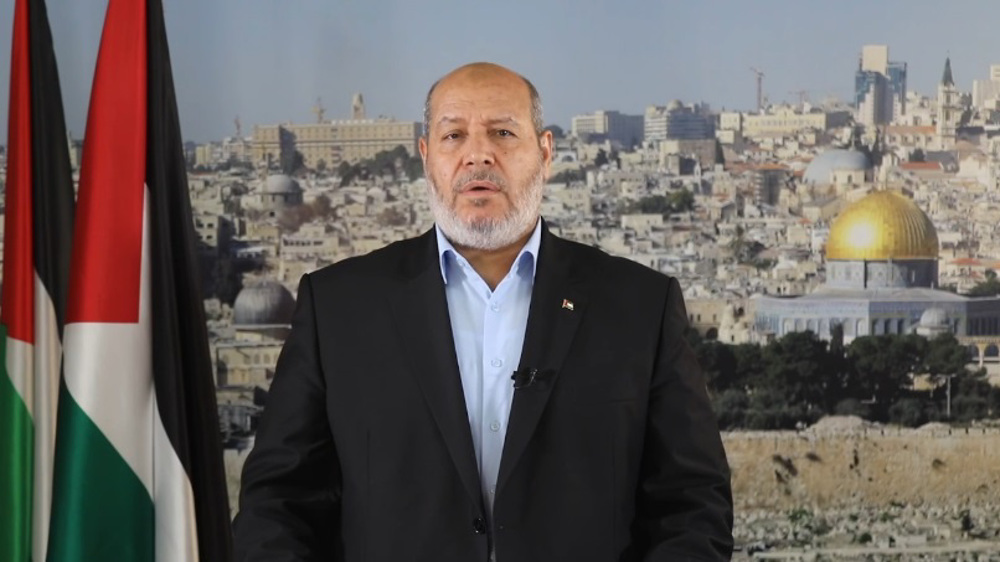Iran military advisers in Syria on Damscus demand: Zarif
Iran’s Foreign Minister Mohammad Javad Zarif says Iranian military advisers are in Syria at the request of the Damascus government.
Addressing the European Union lawmakers in Brussels on Tuesday, Zarif also dismissed media allegations that Iran has sent troops to Syria to fight for Syrian President Bashar al-Assad, saying Tehran has no “boots on the ground” but only "military advisers" at the request of the Syrian government.
“There we have military advisers at the request of the government of this country (Syria). We will move out military advisers when the local government deems it necessary for us to remove them,” he pointed out.
He said Syria has a “legitimate” government which is also recognized by the United Nations, adding, “Those who are conducting measures in Syria without a mandate by a legitimate government are violating international regulations.”
"You feel the consequences of the growth of extremism in our region in terms of refugees that come to Europe, in terms of the spread of unfortunate terrorist incidents in various European cities. Extremism cannot be contained in one country or one region. It's a global menace, requiring a global response," the Iranian minister told the European Parliament session.
He stressed the importance of cessation of conflict in Syria, saying it is the Syrian nation who should decide their own fate.
Zarif emphasized that regional countries, particularly Saudi Arabia, cannot determine the outcomes of Syria peace talks, saying, “We will not make any decision for the Syrian people. They cannot also decide for the Syrian people.”
The foreign-sponsored conflict in Syria, which began in March 2011, has claimed the lives of some 470,000 people and left 1.9 million injured, according to the so-called Syrian Center for Policy Research.
Moreover, 6.36 million people have been displaced internally and more than four million others have fled the country since the beginning of the conflict.
Syria accuses Saudi Arabia, Turkey and Qatar of funding and arming terrorist groups operating inside the country, including Daesh.
Zarif: Abandon ‘military’ illusion on Syria
Addressing a joint press briefing with EU foreign policy chief Federica Mogherini in Brussels on Monday, Zarif said Iran’s “regional neighbors” must abandon their “illusion” that the Syria issue has a military solution.

The Iranian foreign minister urged parties to stick to their commitments agreed in Munich Security Conference by world powers on Friday about cessation of hostilities in Syria.
"What we agreed in Munich is cessation of hostilities, not a pause, to allow the allies of certain regional players to regroup and that is extremely important," he said.
"We have to accept that Daesh and al-Nusra are not going to serve anybody as a political leverage. As soon as some of our regional neighbors understand this reality and abandon the illusion that they can take advantage of this in order to advance their political agenda - delusional as it may be - then we are moving towards a realization of the comprehensive cessation of hostilities and a ceasefire,” he added.
Zarif noted that Iran does not use diplomacy “to gain anything, but at the same time people cannot use diplomacy in order to provide a human shield for al-Nusra and Daesh working as a leverage."
Speaking in a Monday televised speech, the Syrian president pointed to a ceasefire agreement reached in Munich and said any truce means preventing terrorists from reinforcing their positions.
According to the Munich statement, the ceasefire in Syria does not include areas held by groups designated as terrorist organizations by the United Nations Security Council, including Daesh and al-Qaeda-linked al-Nusra Front.
Mideast conflicts affecting Europe, entire globe: Iran FM
Addressing a joint press briefing with his Belgian counterpart Didier Reynders in Brussels on Tuesday, Zarif warned that the adverse consequences of the ongoing conflicts in the Middle East would affect Europe and the entire world.
“So we need to think together, work together and hopefully act together in order to bring about some alleviation of the suffering [in the Middle East] whose impact will not be limited to our region but as you have seen both in the number of terrorist operations here in Europe as well as in the influx of refugees in Europe that will be felt far away from our region and will affect the entire globe altogether,” the Iranian minister said.
He called for collective efforts to resolve the ongoing crises in the Middle East, particularly in Syria and Yemen.
“The war in Yemen is reaching the height of unreasonableness. Civilians have become the only target in Yemen for the past many months…So the civilians are paying the price,” he added.
Zarif said the Syrian people are suffering extensively because of the continuation of violence in the country and the presence of extremists such as Daesh, al-Nusra and other extremist organizations.
“So we need to work together in order to find a political solution, to put an end to the fighting and first and for the most to provide humanitarian access and humanitarian relief both in Yemen and Syria and elsewhere,” he said.
Hamas thanks Iran, Resistance Front following achievement of ceasefire in Gaza
'Capitulation': Israeli officials and media concede Gaza defeat as truce unfolds
'Gaza has won': Social media users react to ceasefire with mix of relief, joy
Iran seeks South Korea’s assistance for AI, fiber-optic projects
VIDEO | Iran's 'Eqtedar' (Power) maneuver
Israel hits HTS military target in Syria for 1st time since fall of Assad
VIDEO | Press TV's news headlines
Israel has slaughtered 13,000 students in Gaza, West Bank









 This makes it easy to access the Press TV website
This makes it easy to access the Press TV website